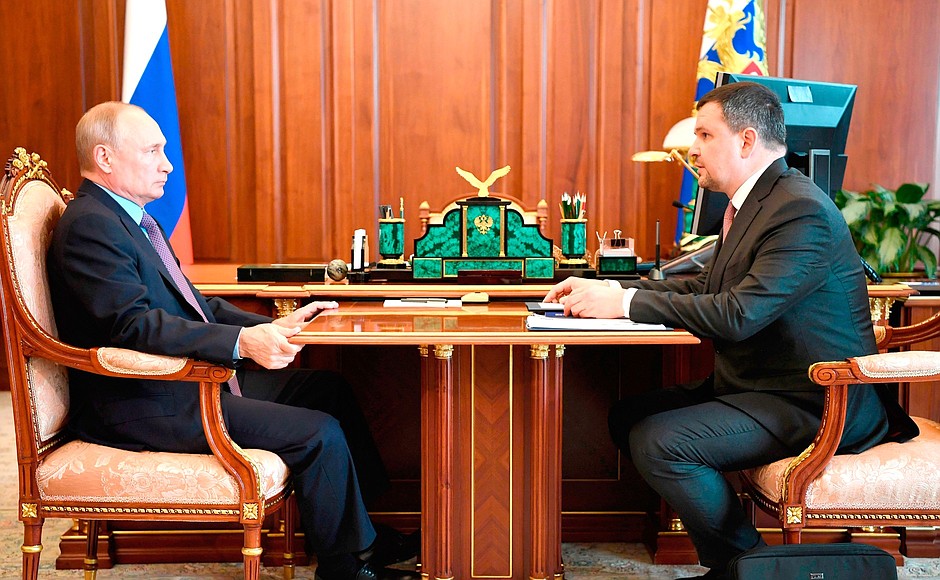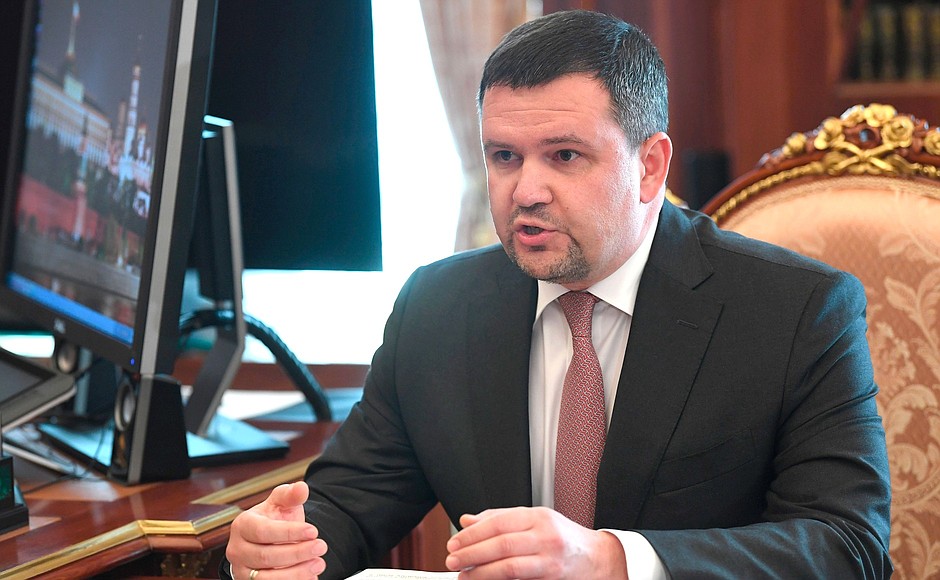
President of Russia Vladimir Putin: Good afternoon, Mr Akimov.
The postal service is certainly among the backbone industries. It must remain uninterrupted and operate not only during a pandemic but even at the time of war. How is the company’s operation organised at the moment?
Russian Post CEO Maxim Akimov: Mr President, as you noted, we never stopped working during the pandemic. We did not lay off any staff and continued to perform our duties, primarily as a federal postal service. Due to the scale of our business – we have 42,000 physical locations and 330,000 employees, we are the second largest commercial employer in the country after Russian Railways, and this fact created a host of challenges that we needed to solve.
The first problem was protecting our staff. We invested significant funds, over 1.5 billion rubles, in personal protection equipment and workplace shields.
The second major task was to launch new products and new solutions that would allow our customers to avoid post office visits during this difficult time. We arranged online and contactless delivery. The Government and the Communications and Mass Media Ministry were very helpful about our decision to extend the storage period for uncollected postal items, parcels and online store goods from 30 to 60 days. We reduced courier delivery rates by half. There was an explosive demand for courier delivery, by thousands of percent. Our mobile app usage also demonstrated a significant growth.
On the other hand, there are some contradictory tendencies as the scope of international trade dropped dramatically. We managed to deal with this task as well by employing our transport fleets, including aviation, to handle the traffic from Southeast Asia. Exports and delivering post abroad proved to be a much more serious problem because of suspended air communications. We are working hard to resolve this issue by involving marine transport and container shipment.
I can report to you that over the past four weeks our revenue has been increasing significantly. Our performance has returned to 2019 levels and we keep growing towards the plan. The revitalisation of consumer activity is certainly a direct indicator of the degree of effectiveness of measures introduced in accordance with your instructions to provide additional support to families and extra income.
Staff turnover has decreased dramatically, by almost 25 percent compared to last year. At the same time, we have a lot of work to do in order to fulfil your instruction to bring salaries to the regional average; however, even a modest income turned out to be attractive to people, and we created 5,000 new jobs. We even temporarily hired staff who had lost their jobs in offline retail, in stores that were forced to close.
We continued to increase wages. Our third wave of salary increases was on May 1, and we did not postpone it. It affected 38,000 people. We will carry out the same wave of increases in the regions on November 1. It will affect 48,000 people, and no coronavirus infection will alter our plans.
Of course, ensuring operational and financial stability was not an easy task. Taking advantage of our high presence, I would like to thank our postal team. 28,000 people have worked from their homes, we tried to organise online work where it was possible to minimise the burden on doctors. This is the largest number in the country, we believe. It is clear that operators of post offices, sorters, drivers and employees of our logistics centres continued to work in difficult conditions, and we did not close our post offices for a single day, except for a three-day period for disinfection. And even then we divided the staff: some still worked around-the-clock.

We have ambitious plans for new products. I would like to tell you not only about how the Post is handling this situation, but also about what it can do that will be useful to the country. We have two ideas.
The first is a product that we called Post-Business. This is a series of digital solutions related to e-commerce. E-commerce gave us a significant increase in revenue for 2019, we crossed the bar of 200 billion, starting with 90 in 2009, this is fast growth. And the main increase is certainly provided by e-commerce, mainly domestic.
It is very important, especially now, to essentially restart small and medium-sized businesses. Online retailing is an ideal way to launch your business, yet government support and decent logistics should be provided. And Russian Post is the only entity that is capable of delivering any item from one location to another (I am not speaking about capital cities), say from Chelyabinsk to Khabarovsk, and of providing cloud services, accounting, commercial accounting and, most important, training people in conducting business online.
We talked about this with Head of SME Corporation Alexander Braverman. It is fully in line with the draft national economic development plan; it involves the relevant activities. This is why we are asking for your support in integrating these measures, all the more so as they do not require major additional financial support. Maybe they involve specific measures of support that are associated with training people, nothing more.
The second major project concerns rural social centres. For 10 million people we are the only point of government presence. We are a shop, a bank and a service centre at the same time. Of course, if the resources of state programmes are allocated properly, without attracting new resources (I mean the programme of state support for rural areas, for their social development and the Digital Economy programme), then Russian Post is an ideal place. With appropriate training, people can be registered here at the Gosuslugi public services portal, undergo some easy diagnostic tests using portable equipment (blood pressure, pulse, blood glucose checks.) It also about financial services, training and enrolment in online courses. All the more so as the Internet is spreading and people should be involved in this story. It, of course, can become a powerful stimulus, considering that we have 11,000 post offices in rural areas. We understand our responsibility, although we work in the market and we do not receive state subsidies, nonetheless we must be successful to preserve this network. Places abandoned by Russian Post are sometimes largely abandoned by life itself.
Therefore, we are asking for support here too. It should be of a coordinating nature. It seems to me that these two stories would be very useful for proper development, both social and economic.
Vladimir Putin: All right.